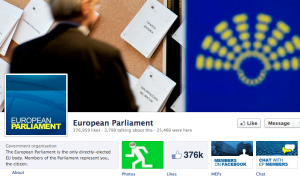 Due to a short Twitter debate with @huettemann I have promised to write this post. As far as I am concerned, social media will have at best a marginal effect on the 2014 European Parliament elections. Here’s why.
Due to a short Twitter debate with @huettemann I have promised to write this post. As far as I am concerned, social media will have at best a marginal effect on the 2014 European Parliament elections. Here’s why.
First though I will mention the major caveat: there are some parties in some places that will do well at the EP elections due to their social media and web networking. These are parties like the Piraten in Germany and Jobbik in Hungary – essentially the very same parties that have been capable of good web networking in national politics.
Beyond that why should we possibly expect social media to have a particular impact on the European Parliament elections? It’s not as if the social media work of the institutions themselves is somehow going to shape the election – the 376k people liking the EP’s Facebook page are surely people already motivated by EU politics. The scale of Twitter take-up in EU politics is even smaller. The major challenge would be to get turnout in EP elections to go up (it’s been falling at every election).
In terms of the everyday election campaign none of the major forces in EU politics – on either the left, the centre or the right – have in any way mastered the ways to use social media to help them win elections. These parties are neither capable of the egalitarian liquid democracy of the Pirates, nor the data mining of Obama, and anyway these parties are not going to get there for a second order election for the EP if they can’t manage it for first order national elections anyway. See Mark Pack’s videos about the 2010 ‘internet election’ in the UK for more – all parties are using the net and social media, but it is not comparatively helping them very much.
So, in short, will social media help boost turnout? Unlikely. Will it give some parties a comparative advantage? Perhaps, but only marginally and for a few parties in a few countries. Will it enthuse people about EU politics? No. Until deep and fundamental lessons are learnt within political parties about the internet and trust, and it is acknowledged that just a change of generation is not helping online politics, we’re not going to see any major step forward in the role of social media in EU politics.








Good and timely post. I’d say that social media could help raise the EP participation rates, but it won’t, precisely because if they do anything, they’ll try and use it to raise the participation rate. This is less contradictory than it sounds.
People will vote in these elections if they think it’s worth their time because it’s important enough. A sustained communication strategy which incorporates social media could help reach that goal … but only if it end-targets those who don’t yet like the EP on facebook, and operates over long time scales (and it would probably help if it talked less about individual Institutions and more about the EU as a whole).
Trying to use social media to get people to vote is preaching to the converted and won’t have much impact. They’ll simply reach Brussels Bubble residents who already like them on Facebook, follow them on Twitter, etc, and who are thus already very likely to vote anyway.